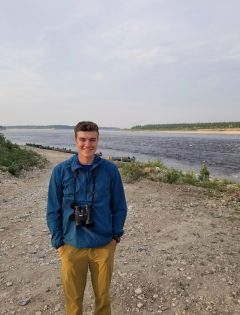Joe Bennett – PI
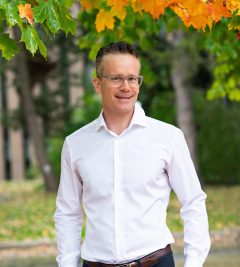
I’m a Professor at the Institute of Environmental Science and Department of Biology at Carleton University, and co-director of the Geomatics and Landscape Ecology Laboratory (GLEL). My research touches on a variety of themes including conservation prioritization, invasion ecology, optimal monitoring, biogeography and spatial statistics. I have a particular interest in practical questions regarding management to protect threatened species and control invasive species. I also work on theoretical questions regarding the value of monitoring information and the determinants of community assembly in terrestrial and aquatic ecosystems.
Trina Rytwinski – Research Scientist
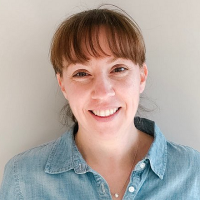
Research
My research focuses on understanding the circumstances in which roads and traffic affect wildlife populations. I am particularly interested in looking at species traits and their behavioural responses to roads, to determine which species or species groups are most vulnerable to road impacts, and determining ways to mitigate road effects. Most recently, I have focused on two road ecology related projects: (1) determining ways to improve knowledge on the influence of mitigation measures on wildlife populations through experiments, and (2) assessing the effectiveness of mitigation measures intended to decrease road related impacts on wildlife through meta-analysis. My research with Dr. Bennett and Dr. Cooke will involve conducting various systematic reviews; one of which is currently underway focusing on evaluating the effectiveness of non-native fish management projects for the restoration of freshwater ecosystems.
Background
I completed my PhD in 2012, at Carleton University, working with Dr. Lenore Fahrig in the Geomatics and Landscape Ecology Research Laboratory (GLEL) studying road effects on wildlife populations. After taking some maternity leave, I returned to the GLEL as a Post-doctoral fellow where I worked part-time from 2013-2016 with Dr. Fahrig on various road ecology projects while also working as a Contract Biologist for various universities and government e.g., Concordia University (Montreal), Canadian Wildlife Service (Ontario region), University of Melbourne (Victoria, Australia), Alterra, Wageningen University and Research Centre (Wageningen, The Netherlands). Prior to my PhD, I worked as a Research Biologist for the University of New Brunswick on a long-term study of the population dynamics of the northern flying squirrel in relation to habitat fragmentation in Fundy National Park, NB. Previous education: M.Sc. Biology, Carleton University (2004-2006); B.Sc. Biology (with Honours), Cape Breton University (2000-2004).
Personal website: https://trinarytwinski.ca/
Jeff Hanson – Research Scientist
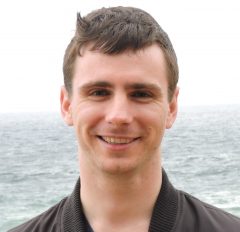
I am interested in helping people make better decisions to conserve biodiversity. My research focuses on incorporating novel datasets into conservation planning exercises (e.g. establishing new protected areas), applying optimisation algorithms to find optimal solutions to conservation problems, and identifying cost-effective surrogate data that can inform conservation decisions when high quality expensive data are not available (e.g. genetic data). I also develop decision support tools to help others apply my findings to their own work. At Carleton University, I am working with Prof. Bennett to optimise the allocation of resources for establishing new protected areas and survey programmes from a shared budget. I hope to provide guidelines that conservation practitioners can use when deciding which places to survey so they can use remaining funds to establish protected areas in the places that will maximize biodiversity persistence.
Personal website: https://jeffrey-hanson.com
Bronwyn Rayfield – Research Scientist
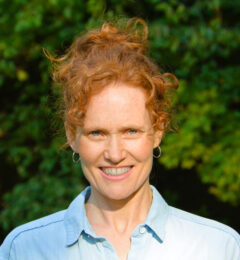
I work to advance and apply scientific knowledge in the field of landscape ecology through applied research and conservation decision support. I bring extensive experience working in collaborative partnerships with academia, government agencies, and non-profit organizations, carrying out a holistic and integrated approach to conservation science. My areas of expertise include landscape modelling, conservation prioritization, natural climate solutions, and habitat connectivity analysis. My research focusses on the ecological consequences of land use and climate change, particularly the effects on wildlife habitat, landscape connectivity, and ecosystem carbon storage.
Lilli Gaston – Research Scientist
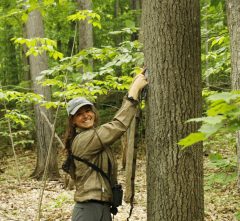
I completed an MSc at Carleton University with Dr. Bennett and Dr. Buxton in 2025. My graduate research explored the effects of traffic restrictions on bird and mammal communities in an urban park. In general, I am interested in using passive monitoring techniques to measure shifts in wildlife diversity, behaviour, and occurrence in response to anthropogenic landscape change, especially for species at risk. I am committed to solutions-based research and mobilizing information to improve conservation management for the benefit of wildlife and people.
When I am not out admiring nature, I enjoy reading fiction, sea kayaking, and spending time with my nieces.
Tim Alamenciak – Postdoc
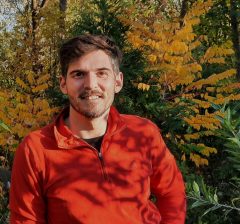
I am a conservation and restoration ecology researcher passionate about engaging the public in this work and taking effective action on the massive challenges facing our planet. My work with the Bennett Lab looks at the effectiveness and outcomes of temporarily conserved areas and conservation easement agreements. I am actively working to improve knowledge mobilization in the lab by developing resources and workshops for researchers.
My educational background is diverse and multi-disciplinary, starting with an Honours Bachelor of Arts in Peace and Conflict Studies (University of Waterloo, 2010), where I first became interested in community engagement and decision-making. I worked as a journalist at the Toronto Star and TVO after earning a Master of Arts in Journalism degree (Toronto Metropolitan University, 2012). I completed my PhD in Social and Ecological Sustainability (University of Waterloo, 2024) under the supervision of Dr. Stephen Murphy. My dissertation focused on increasing volunteer engagement in conservation and restoration by analyzing motivations, organizational structure and grassroots organizing techniques. I am committed to teaching and knowledge mobilization, and earned the Certificate in University Teaching (University of Waterloo, 2022).
I live in Kitchener, Ontario, with my wife Emily and our son Ollie. I am an avid woodworker, hand papermaker and occasional baker.
Personal website: https://tim-a.ca
Daniel Dylewsky – Postdoc
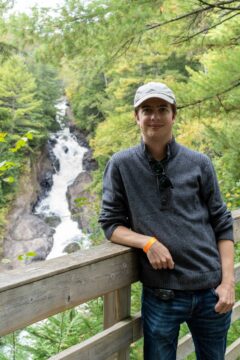
I am a postdoctoral researcher investigating computational methods for ecological conservation prioritization. I started my research career in physics and applied mathematics at the University of Washington in Seattle, where I wrote my PhD thesis on theoretical statistical and machine learning techniques for complex nonlinear dynamical systems. Since then I have focused on applications of these methodologies to problems in environmental science. I am interested in exploring how environmental data can be leveraged to better understand and anticipate nonlinear dynamics in the climate and the biosphere. My current research focuses on how data-driven models can be used to inform decision-making for wildlife conservation.
Ana Hernández Martinez De La Riva – Postdoc
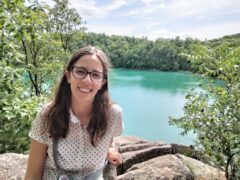
I am a conservation biology researcher with a special interest in species at risk, remote sensing, and environmental decision-making. My work with the Bennett Lab involves exploring large datasets of conservation management actions to help practitioners prioritize actions based on their financial costs and expected outcomes.
Throughout my academic journey, I have had the opportunity to live and work in several countries, studying a wide range of conservation topics. For my BSc in Conservation Biology (St. Lawrence University, NY, USA), I examined the effects of hydropower dams. During my MSc in Biodiversity and Conservation in Tropical Areas (UIMP-CSIC, Madrid, Spain), I applied molecular techniques to study sex determination in the moss Ceratodon purpureus. And in my PhD here at Carleton University, I explored the pros and cons of community science, remote sensing, and environmental DNA for detecting rare plants.
None of these projects would have been possible without the support of my colleagues, supervisors, and family, to whom I am deeply grateful. I believe in the importance of “paying forward” the opportunities I have received. For that reason, I serve as Chair of the Equity, Diversity, and Inclusion Committee for Graduate Students and Postdoctoral Fellows in the Faculty of Science.
I am also passionate about making science more accessible. Whenever I can, I like participating in science dissemination events, such as Carleton’s Three Minute Thesis (3MT) competition where I won the first place: https://www.youtube.com/watch?v=w4VSCCZ-7JI.
In my free time, I enjoy swimming, spending time with family and friends, going on walks, and painting mandalas.
Reyd Smith – PhD (co-supervised with Dr. Jennifer Provencher)
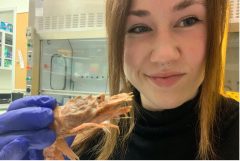
I completed my BSc (Honours) at the University of Manitoba, where I focused on how artificial light exposure alters the spring migration phenology of purple martins under the supervisor of Dr. Kevin Fraser. Next, I shifted to Arctic systems during my MSc at the University of Windsor alongside Dr. Oliver Love. My thesis was focused on inter-colony isotopic niche and the effects of cumulative stressors on reproductive phenology, hormones, and behaviour in female common eider ducks.
In collaboration with the Nunatsiavut Government, for my PhD I am examining accumulation patterns and the health implications of polycyclic aromatic compounds (PACs) in seabirds following a diesel oil spill in Newfoundland and Labrador. Common eider, black guillemot and great black-backed gulls will be examined for PACs, toxicokinetics and metabolomics, as well as isotopic niche characteristics to determine the routes and temporality of PAC exposure in the years after the oil spill.
Overall, my priorities are centred around the inclusion of Indigenous knowledge in all aspects of scientific research, including disseminating results back to the community. My general research interests include examining cumulative stressors such as contaminants, climate variables and foraging ecology, and the potential implications on health and reproductive success. Research aside, in my spare time, I dabble in birding, hiking/camping, snowboarding, gardening, and hanging out with my dog, Caspian.
Lucas Haddaway – PhD
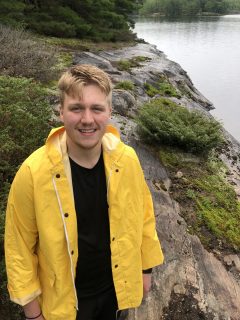
I completed my Bachelor of Science in Biology at the University of Waterloo in 2021. In my Honours thesis I focused on the ecology and behaviour of bat species during migratory stopover. Upon graduation I worked as a Conservation Technician at the rare Charitable Research Reserve in Cambridge Ontario. In this position I supported invasive species management, and turtle conservation efforts. My research interests fall under the broad category of conservation policy, and I am specifically interested in species at risk legislation, illegal wildlife trade, and private land conservation. My current research focuses on engaging with private landowners to identify how land management can be optimized to support the conservation of species at risk in Ontario.
Emily McKnight – PhD
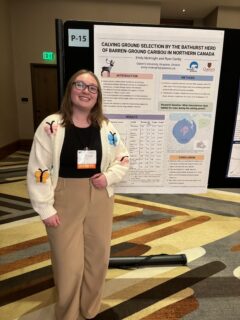
I completed my BSc (Honours) in Environmental Biology and MSc in Geography at Queen’s University. My undergrad group thesis focused on climate mitigation and GHG reduction through promotional active transportation events using European car-free day infrastructure. Though I am an environmental advocate, my passion has always been for animals in any capacity, but especially their conservation and preservation. My MSc thesis used a resource selection function and landscape pattern analysis to quantify calving ground selection for a barren-ground caribou herd in Nunavut experiencing a critical population low. My research interests include conservation prioritization, GIS and spatial statistics, and mammal and avian landscape ecology. At Carleton, my PhD will use public sway and management strategies for rare and charismatic species as a framework to maximize conservation efforts for undervalued threatened and endangered species.
Outside of school, I love going on long walks, reading, playing guitar/bass/ukulele, and gardening.
Jaimie Vincent – PhD
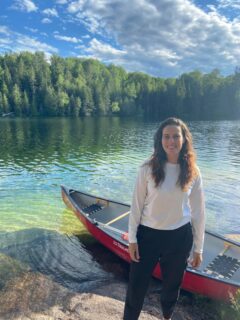
Hello! My name is Jaimie (she/her). I am a PhD student of settler Canadian and Anishnabe (Algonquins of Barriere Lake) heritage. I am working in partnership to co-design Indigenous community-led moose monitoring with the Anishnabe Moose Committee, a grassroots group dedicated to the protection of moose in Anishnabe territory. My research is grounded in a commitment to community-driven research and to the ethical responsibilities of scientists working in Indigenous contexts. My ongoing involvement with Research for the Front Lines, an organization that supports communities and movements fighting for environmental and climate justice through research, also informs my approach. Prior to my PhD, I held a research manager position in the lab. I also had the opportunity to work with Nature Conservancy Canada to support Cree-led protected area planning in Eeyou Istchee. I completed a BSc (2017, Université Laval) and MSc (2020, Carleton) in Biology as well as a Graduate Diploma in Indigenous Policy and Administration (2021, Carleton).
Justin Kreller – MSc (co-supervised with Emma Hudgins, University of Melbourne)
I joined the Bennett Lab in the fall of 2023 after being selected for the Weston Family Conservation Science Fellowship Program at the Nature Conservancy of Canada. My research, co-supervised by Drs. Emma Hudgins and Joe Bennett, is focused on building models to map the distribution and forecast the spread of some of Canada’s most invasive plant species in relation to landscape connectivity and climate change. The results of my project will help forecast the future burden of invasive plants and inform land stewardship and conservation efforts across the country.
Like most biology students, I enjoy being outdoors and performing fieldwork, notably in my recent work as a Student Biologist at the National Capital Commission. I also make regular contributions to the Ontario Breeding Bird Atlas, a project that has enabled me to take part in a canoe trip along the upper Winisk River as well as survey northeastern Ontario as a Wildlife Technician. It is this same passion for the environment that had pushed me to shift my career path towards conservation and pursue Fish & Wildlife Conservation Technician studies at Sault College (OCD, 2023) following my degree in Biomedical Mechanical Engineering from the University of Ottawa (BASc, 2020).
Outside of school and work, I can be foundpracticing sports,birding, camping/hiking, reading, enjoying music, or walking my sweet German shepherd, Atlas.
Kara Gerrow – MSc
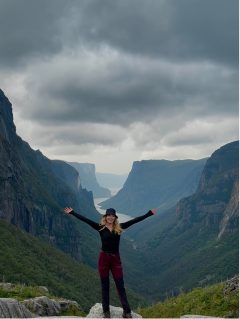
Growing up in rural Newfoundland, I spent a great deal of my childhood outside. This cultivated a deep love for both plants and animals, and lead to me perusing and completing my BSc. (Honours) in Biology at Memorial University of Newfoundland in 2018. My honour’s research studied the foraging behaviour of Common Murres fitted with geolocators at the species largest colony, Funk Island Ecological Reserve. After graduation I worked as a research assistant tracking and radio-collaring caribou on Fogo Island and snowshoe hare in Terra Nova National Park. From 2018-2023 I worked in both emergency and general practice veterinary medicine with varying roles from ICU to surgery. In 2023 longing to reconnect with nature and my roots, I worked as a private hiking guide in Gros Morne National Park’s backcountry. A summer of guiding combined with a two month stay in the Westjfords region of Iceland reignited my passion and love for biology. I spent the winter of 2024 working on a wetland restoration project with the NCC before starting as a master’s student in Dr. Bennett’s lab in the spring. My research interests include spatial ecology, species at risk and conservation policy. I am particularly passionate about avian and wildlife conservation tools and strategies, and how to use these tools to improve the status of species at risk in Canada. In my spare time you will often find me outside! I am an avid runner, hiker and paddleboarder and I enjoy going for bike rides with my German Shepherd, Nora.
Amy Bachhuber (she/her) – MSc
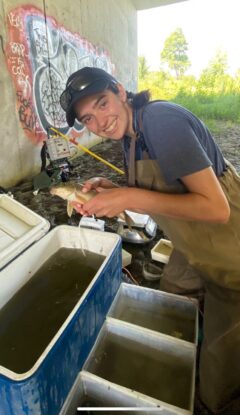
I completed an undergraduate honours degree in biology with a concentration in ecology, evolution and behaviour at Carleton University. During my undergrad I completed my honours thesis with Dr. Dakin, where I used R studio and eBird citizen science data to examine whether urbanization had effects on social flocking in four North American bird species. Since my undergraduate degree, I have been working at a Conservation Authority as an environmental resource technician, where I sample lakes and streams and analyze water quality data throughout the Rideau Valley Watershed. I have also been very fortunate to be able to contribute to habitat restoration projects, as well as fish biodiversity and abundance monitoring, and benthic invertebrate sampling. I have always been fascinated with aquatic creatures, specifically amphibians, reptiles, and insects. I enjoy being outdoors and learning more about how we can conserve natural habitat and preserve biodiversity as nature faces new and ongoing challenges. I am interested in conservation science and how we can apply scientific findings into management and policy. I am currently working on a masters degree in biology with Dr. Bennett, where I will be compiling a meta-analysis on wetland restoration methods.
Richard Schuster – Affiliated Scientist
I am the Director of Spatial Planning and Innovation at the Nature Conservancy of Canada (NCC). I am responsible for the development and implementation of NCC’s conservation planning framework, strategic conservation planning research efforts, and new conservation technology initiatives.

